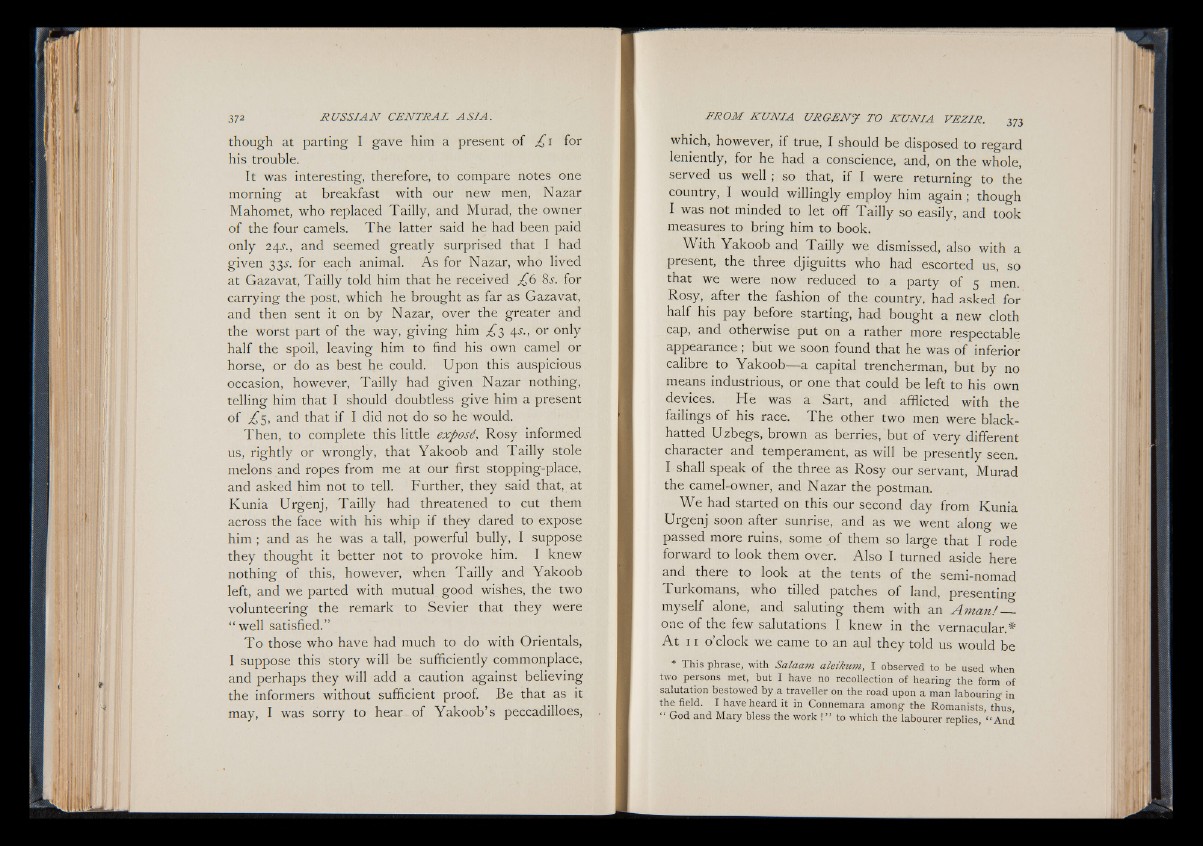
though at parting I gave him a present of £\ for
his trouble.
It was interesting, therefore, to compare notes one
morning at breakfast with our new men, Nazar
Mahomet, who replaced Tailly, and Murad, the owner
o f the four camels. The latter said he had been paid
only 24A, and seemed greatly surprised that I had
given 33s. for each animal. As for Nazar, who lived
at Gazavat, Tailly told him that he received £6 8y. for
carrying the post, which he brought as far as Gazavat,
and then sent it on by Nazar, over the greater and
the worst part of the way, giving him ^ 3 4.S., or only
half the spoil, leaving him to find his own camel or
horse, or do as best he could. Upon this auspicious
occasion, however, Tailly had given Nazar nothing,
telling him that I should doubtless give him a present
of £5, and that if I did not do so he would.
Then, to complete this little exposé, Rosy informed
us, rightly or wrongly, that Yakoob and Tailly stole
melons and ropes from me at our first stopping-place,
and asked him not to tell. Further, they said that, at
Kunia Urgenj, Tailly had threatened to cut them
across the face with his whip if they dared to expose
him ; and as he was a tall, powerful bully, I suppose
they thought it better not to provoke him. I knew
nothing of this, however, when Tailly and Yakoob
left, and we parted with mutual good wishes, the two
volunteering the remark to Sevier that they were
“ well satisfied.”
T o those who have had much to do with Orientals,
I suppose this story will be sufficiently commonplace,
and perhaps they will add a caution against believing
the informers without sufficient proof. Be that as it
may, I was sorry to hear of Yakoob’s peccadilloes,
which, however, if true, I should be disposed to regard
leniently, for he had a conscience, and, on the whole,
served us well ; so that, if I were returning to the
country, I would willingly employ him again ; though
I was not minded to let off Tailly so easily, and took
measures to bring him to book.
With Yakoob and Tailly we dismissed, also with a
present, the three djiguitts who had escorted us, so
that we were now reduced to a party of 5 men.
Rosy, after the fashion of the country, had asked for
half his pay before starting, had bought a new cloth
cap, and otherwise put on a rather more respectable
appearance; but we soon found that he was of inferior
calibre to Yakoob— a capital trencherman, but by no
means industrious, or one that could be left to his own
devices. He was a Sart, and afflicted with the
failings of his race. The other two men were black-
hatted Uzbegs, brown as berries, but of very different
character and temperament, as will be presently seen.
I shall speak of the three as Rosy our servant, Murad
the camel-owner, and Nazar the postman.
We had started on this our second day from Kunia
Urgenj soon after sunrise, and as we went along we
passed more ruins, some of them so large that I rode
forward to look them over. Also I turned aside here
and there to look at the tents o f the semi-nomad
Turkomans, who tilled patches of land, presenting
myself alone, and saluting them with an Am a n ! _
one of the few salutations I knew in the vernacular.*
A t 11 o’clock we came to an aul they told us would be
* This phrase, with Salaam aleikum, I observed to be used when
two persons met, but I have no recollection of hearing- the form of
salutation bestowed by a traveller on the road upon a man labouring- in
the field. I have heard it in Connemara among- the Romanists, thus
I God and Mary bless the work ! ” to which the labourer replies, “ And